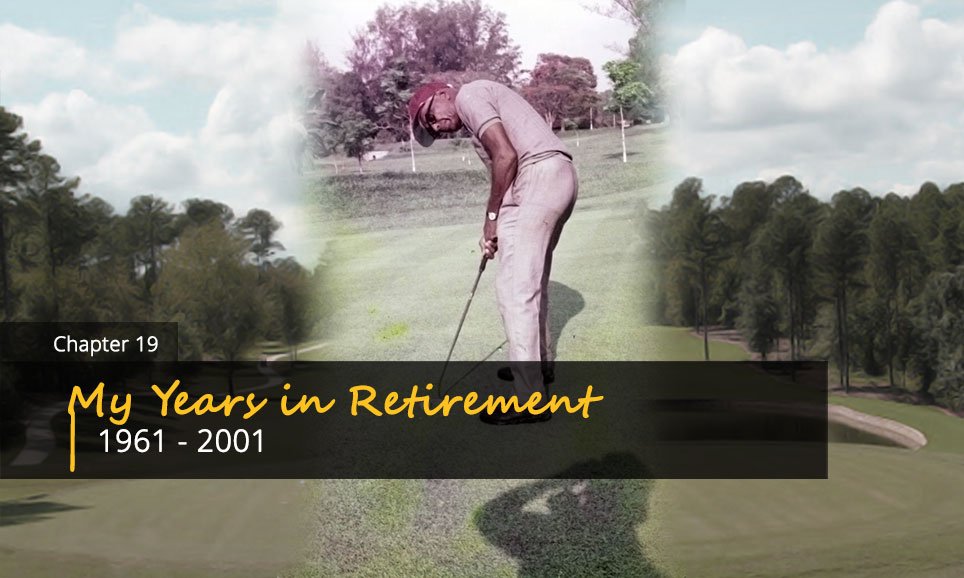
Having departed from the Ministry of Education, I began my life “in retirement” without pre-laid plans. I was pleased to find I had made more truly genuine friends than I had anticipated. Several of them, who were my former colleagues, dropped in for a chat and demonstrated their regard for me.
New work opportunities
During the first decade of my retirement, I continued to have many ideas about education, and spent the initial years of retirement struggling to find suitable outlets.
Although I had three well-paying private tuitions, I had sufficient energy and time to take on a full time position. However, we soon discovered that any institution that wished to employ me would have to obtain the permission of the Minister. Thus, I lost the opportunity to accept the position of Registrar of the Singapore Polytechnic.
My faithful friend, Dr. B.R. Sreenivasan, Vice Chancellor of the University of Malaya in Singapore, offered me a job after my own heart as a Special Lecturer, on a salary of $1700/ p.m., for four semesters. I was to run a department with three assistants, to raise the standard of English of former students of Chinese Middle Schools prior to admission to the University. The Vice Chancellor probably by-passed Yong and obtained permission directly from the Prime Minister. He also invited me to serve on an advisory committee.
Immediately after I had completed my University contract, the Principal of the Teachers’ Training College engaged me as a part-time Lecturer. About a year later, the Principal told me that he received instructions to dispense with all retirees employed as lecturers, although there was a shortage of teachers and lecturers.
The Supervisor of night classes offered me a teaching job; I accepted that. Later, the Principal of Stamford College offered me full day-time teaching.
Many people urged me to consider setting up a private school. I rejected the idea because I knew that there were well-established correspondence courses and few people could afford to send children to private schools. My judgement proved right. A few years later, a couple of colleagues who did venture into setting up private schools, failed. I could have gone to Brunei and taught there. However, I wanted to be with my family especially as three of my children were still studying. I resigned myself to live on my pension and from earnings from private tuitions.
Backlash affects Mangalam and Leela
Two events shortly after my retirement distressed me greatly. The Ministry vindictively transferred Mangalam from Anthony Road Girls’ School, which was close to home, to Bedok Girls’ School several miles away. This placed an immense level of stress on her, and incurred higher travel costs. The other event concerned Leela. She previously had good grades in the School Certificate, but had long periods of absence from school due to illness episodes with measles, chicken pox and headaches during her two-year Higher School Certificate (HSC) years. She did not do well in her final examination. She was still under-aged for the HSC, and had an exemplary record in behaviour. However, the Ministry refused to give her permission to repeat her year in the HSC class to try for better grades. I feel this blighted her life for a long time.
I felt that both these actions were vindictive and reflected the Minister’s anger at me.
I contribute ideas
In 1962, the Government appointed the Lim Tay Boh Commission to study and make recommendations to improve Education in Singapore. I submitted a couple of memoranda, but was surprised that the final Report did not acknowledge them. The two notable recommendations I made were:
- To establish Junior Colleges with hostels for students from both English and Chinese media schools as a strategy to reduce barriers between the two streams.
- Junior Colleges were later set up but not with hostels as I had suggested.
- That the University adopt English language as a separate subject from Literature.
- This too was adopted later.
I asked for permission to publish my memoranda. However, I had to desist because the authorities threatened me with legal action if I published them.
Health challenges
In 1966, I developed a persistent cough. My daughter-in- law, Mary took me to a specialist physician, Dr. Seah Cheng Seang. He feared I might have lung cancer and sent me to a surgeon, Dr. Yahaya Cohen for endoscopy. The diagnosis was inconclusive, and Yahaya wanted to operate. I requested we wait for Mahendran to return from Liverpool before the operation. I was not too worried. Yahaya did a biopsy and found that I had an adenomatosis. He removed the two lower lobes of my right lung.With good care from the Anaesthetist Pais, from the nursing staff and voluntary free nursing at night by Mrs. Pais, I was not too much of a burden on my family. However, I realised that I was a poor patient who could not bear much pain. My back hurt badly for many days, but with Yahaya’s advice, I rehabilitated myself mowing the lawn with a push mower and eventually was able to return to tennis.
Seven years later, in 1973, I had a sudden explosive headache. I called Dr. Lee Hoe Guan, my former pupil. He came very promptly, diagnosed it as cerebral bleeding, gave me interim medication, and made rapid arrangements to send me by ambulance to the Tan Tock Seng Hospital. Rajen came from his home in Hillcrest and accompanied me. On my arrival at the hospital, Dr. Gopal Baratham immediately attended to me, did a brain scan, which did not reveal any detectable cause for the hemorrhage, assured me that I would have normal health after a three-week bed rest. The bleeding did not recur.
For the next 25 years, contrary to the opinion of several doctor friends, I have been getting my driving license renewed annually with Dr. Gopal Baratham’s certification. In fact, I have driven several times to Kuala Lumpur, without causing any accident.
My present doctor F.J.Jayaratnam, together with Mary, have been keeping me in good health for 25 years and recently pulled me out of serious pneumonia. Gnanam, our youngest daughter, born intelligent and quick witted, studied Law and went into private practice. When I fell seriously ill with pneumonia, in September 1998, she nursed me through the nights with much patience and skill both at the hospital and after I came home.
I am celebrating my 92nd birthday writing this. Thus, my health in old age has been safe, and I have avoided the sad state of health that so many of my friends struggled with in their declining years.
Purchasing power of my pension declined
I did not expect to live beyond 70 and believed that my pension would be adequate for the rest of my life. I was not worried. However, I lived far beyond 70, during which time, the economy improved but inflation rose. The purchasing power of my pension declined. I planned to alter drastically my way of life. However, my children began demonstrating their filial love. Indra and Rasa gave steady me financial aid to enable me to continue with my life style, and Leela shared her roof with me when I did not have a ground under me or a thatch over my head.
Vacations
During my days in employment, I was so committed to my work, my family and my extramural activities that I had no time for holiday trips. In 1956 when I attended a World Education Conference in Geneva, I planned to extend my stay in Europe with a weekend tour of the Alps and a seven-day vacation trip to Britain. The threat of a teachers’ strike in Singapore dashed my plans, and I had to return to Singapore.
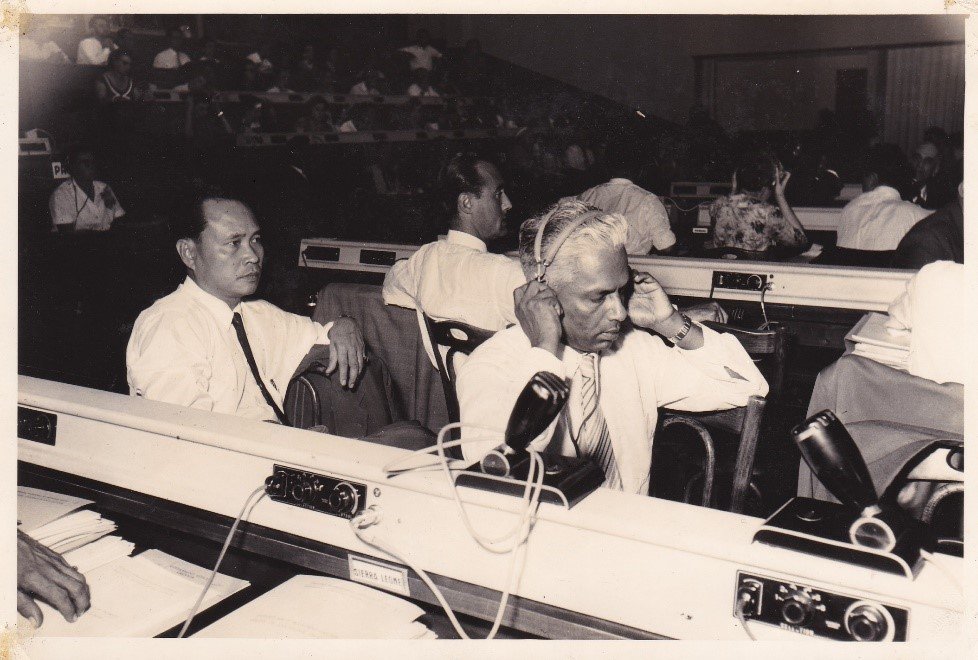
Ambiavagar at the UNESCO conference in Geneva.
My first relaxed holiday trip came in 1970. Mahendran persuaded Mangalam and me to visit him in New York and we enjoyed various jaunts by car, train and boat in the city and state of New York .
Subsequently Rajen and Poh Choon sent us airfares to join them on vacation tours almost every year for several years, and we went on tours that covered several states and places of entertainment. On one occasion, Rasa and Indra extended those tours to include the Great Lakes, the Niagara Falls and Toronto in Canada. On other occasions, Indra and Rasa took us on tours in the U.K. from London through Wales to the west coast and the Lake District. On our own, we would probably not have made any of the trips. Among the highlights was our grandson Dilip’s convocation in Nottingham and granddaughter Rohini’s wedding in London. In addition, our children and their spouses, and our six grandchildren have been shielding me from the heat and chill of advancing years.
Helping Ceylon Sports Club resolve financial problems
Although I participated actively in sports at the Ceylon Sports Club almost from its inception, I usually avoided meetings. I wished to avoid nomination for election. However, one year, during my retired years, the President and two other top office bearers persuaded me to stand for election as President. The Club’s finances were in the red, and the committee feared that someone illegally siphoned income from the jackpot machines and card room. The current office bearers had full time jobs and could not detect the loopholes.
I explained that I had ceased to serve on the Club Committee for several years because Committee meetings would take decisions on revenue control, but the President would not implement such decisions. As a result, large debts incurred at the bar remained in arrears, and kept increasing. Politicking among electing officials was the underlying cause of the Club’s troubles. The three officials who persuaded me, promised to join the committee and back my decisions. I agreed to the task. I took charge of one key to the jackpots, and attended every occasion when the tax authorities opened them. Thus, I prevented any money slipping away before the tax officials came. However, I could not control the card room. I did not gamble and could not find suitable members to ensure honest collections. Moreover, the House Member allowed non-members to use the card tables although this was illegal. I managed to implement the rule that members in arrears were suspended – and of course, they became enemies. However, my year ended with a good credit balance, and we paid off all creditors. Members who disliked the strict measures succeeded in throwing me out at the next General Meeting. I did not counter their campaign. It was my policy never to seek office, and to accept office only if I was wanted.
I had a harrowing experience at the Club – I witnessed the death of C. Thuraisingam when he was playing in the finals of the Club Tennis Single’s Tournament. He had a weak heart but he was one of our best all-round sportsmen, excelled at all games, and defied his heart condition. He continued to play tennis after he had stopped athletics, cricket, hockey and soccer. I was at the billiard table when I saw him collapse. His eldest daughter who was playing hockey at that time saw her father collapse, ran to him and cradled him in her lap. I too ran to him. He asked for water. I ran back, sent someone with a glass of water, rang for the ambulance as well as for my son, Mahendran, who was an anesthetist and was at home, in Dalkieth road. The ambulance was slow in coming. Mahendran arrived first and tried to revive Thurai with mouth-to-mouth breathing but it was too late. The paramedics could do nothing but take him and his daughter away. I followed in my car but did not realise they had taken him to the General Hospital, while I went to Tan Tock Seng Hospital, which was closer. I drove to his house to inform his wife.
Putting pen to paper
During my days in the education service, I told myself I would write when I retired. However, several experiences in the latter part of my life (which I wish to keep out of print) kept intruding in my life and my thoughts, and drained my energy and motivation to write. I abandoned all ideas of writing, with the exception of a small book for Primary Six pupils – even that was done under my wife’s nagging! I also wrote a few articles. It was later in 1992 that I wrote and published a book of short stories, which sold well enough to cover all my expenses. Other than those efforts, I wrote a few articles for magazines and souvenir books, and this autobiography occupied me in later years.
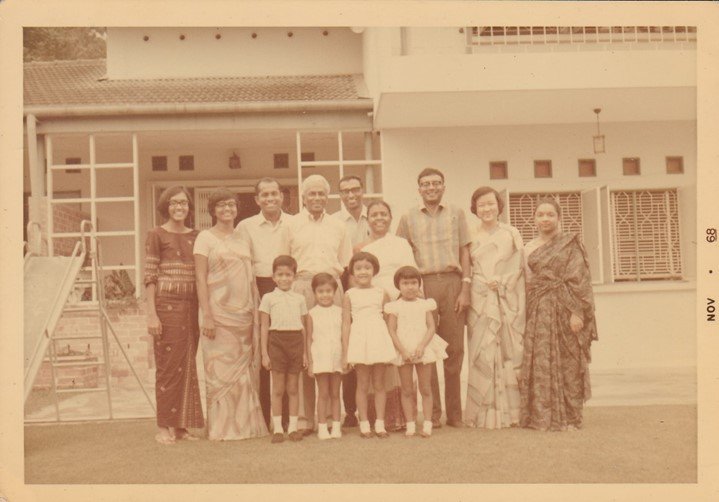
The Ambiavagar family: November 1969
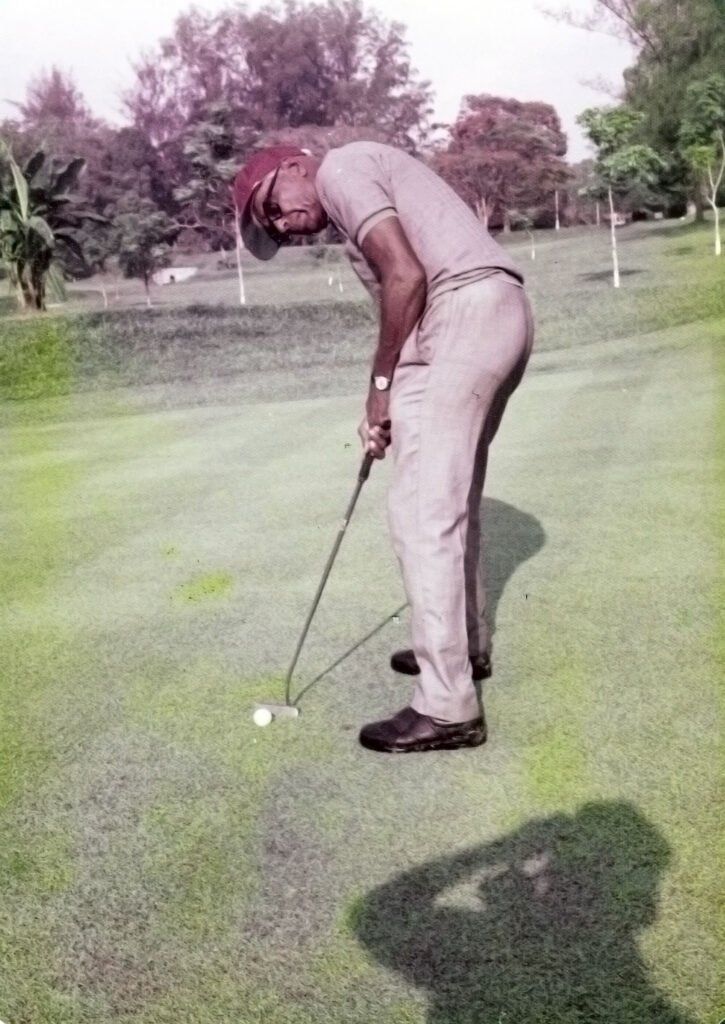
Golf brought Ambi a new lease of life.
During the period 1969 to 1990, golfing was one of my most rewarding experiences. In 1952, my friends Low Kee Pow and Philip Liau tried to persuade me to play golf. However, I excused myself, saying I was satisfied with tennis and was too busy with work. In 1969, Ragu persuaded me to try hitting a few balls. I found that hitting a stationary ball was much easier than dealing with a moving ball at cricket or hockey. Ragu took the opportunity to get me to sign the application form to the Seletar Golf Club. Mangalam said she did not want to remain at home for long hours while I played golf. Hence, she decided to participate in the game and avoid loneliness, and eventually became the Captain for the Ladies Section.
I began with the practice range, followed soon after on the course, and very shortly began participating in competitions. An additional bonus was the opportunity for socialising frequently not only with friends, former colleagues and pupils, but also with new personalities some of whom have made outstanding contributions to the development of Singapore. I became acquainted with a vast variety of attitudes and outlooks on life and cultivated warm-hearted friendships. At the gold club, I found an outlet for my energies and interests.
- I travelled to competitions in Johor Bahru, Seremban and Kuala Lumpur with Roland Schoon, Vincent Gomez and Boon Oon San.
- I edited and published Nespic, the club magazine, with valuable help from Jimmy Almeida and Keith Sim, and set an example by making it financially self-sufficient through advertisements.
- This stimulated me to think constructively on new topics, write articles on golfing topics, and even write a verse to say “Thank You” to the club.
- The golf shop, Pan West, encouraged me, as an old man to remain active at golf, by giving me discounts for equipment and bought advertisements to help Newspic.
- I served on the Green and Management Committees, which enabled me to give service in return for the pleasure of golfing and think about topics for Newspic.
Off course, golf gave Mangalam and me topics other than personal and family matters to talk and argue about!
After 1990, when I reached 85, I continued golfing but at a reduced level until June 1997, when at age 92, a severe bout of pneumonia put me off golfing.
Intervening in the Temple dispute
I intervened in a dispute in the Sri Senpaga Vinayagar Temple to see justice prevail. A few members took revenge on me by taking libel action against me for the action I had taken in the Temple. The issue was finally resolved when the complainant withdrew his action and paid $35,000/, for my legal fee. Joethy, my solicitor, split the fee between his senior advising Counsel and himself but donated his share to a Scholarship Fund at Raffles Institution (RI) that he suggested be named after me. Samuel Dhoraisingam not only approached the Principal of RI to have it established but made appeals for donations to the fund and made a big success of it.
Gratitude for warm and sustained affection
The warm and sustained affection of my former students and colleagues, gratify me and sustain my spirits. Notably,
- the Old Rafflesians Association, under its president Dr. Chan Peng Mun, and the
- University Alumni Affairs under its Director, Peter Lim, have boosted my ego by making much of me.
- Several classes of former pupils warm heartedly entertained me frequently.
I am saddened that several former pupils, friends and colleagues who gave me constant emotional support, such as K.Sabapathy, C.A.Sinnathamby, Retnasabapathy, T.E.K. Retnam, Low Kee Pow, Phoa Hock Seng and S.Y.Han have preceded me beyond the horizon.
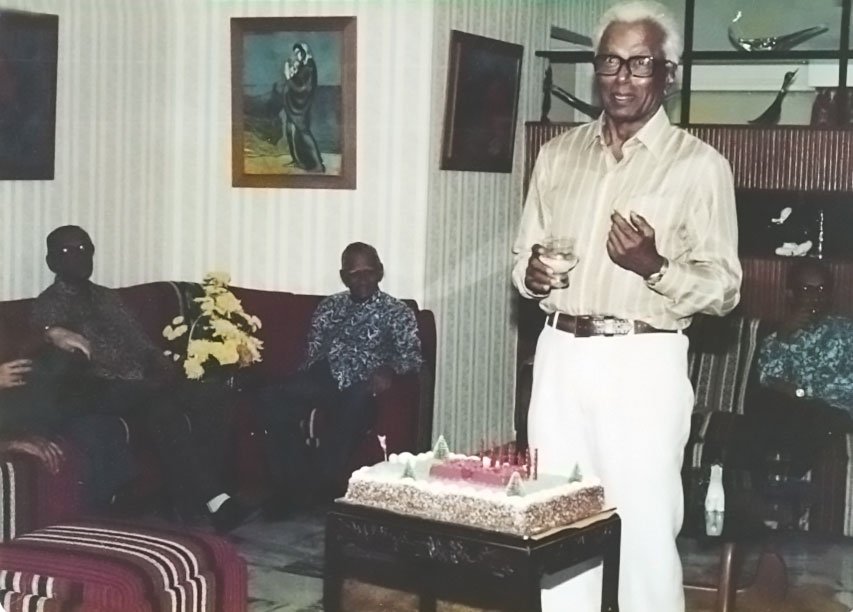
Ambi celebrated his 75th Birthday in 1980.
Indra and Pathmanathan organized a reunion of old friends and former students to celebrate the occasion.
Ambi with former students James Puthcheary (prominent lawyer and social activist) and Geoffery Leembruggen, (Director, Malaysian Industrial Development Foundation).
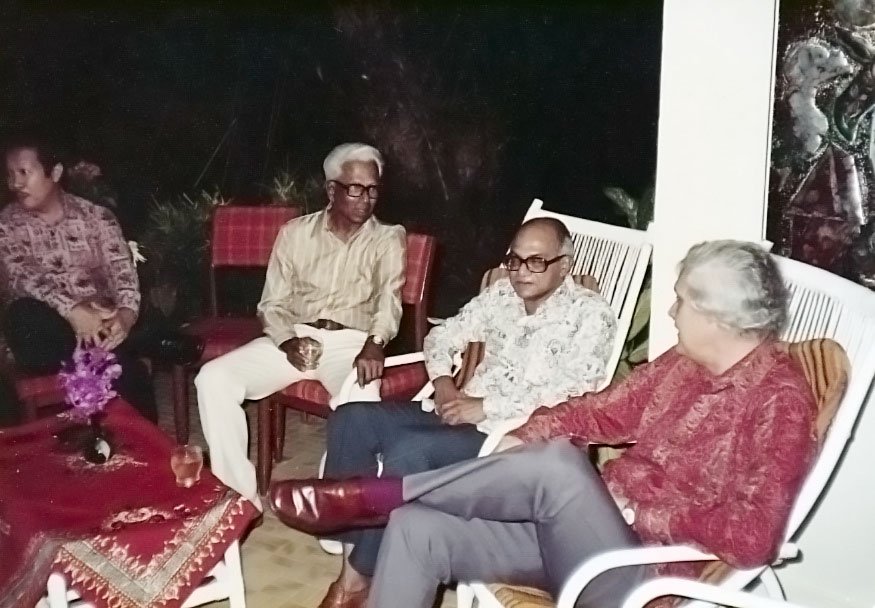
Birthday celebrations 1980
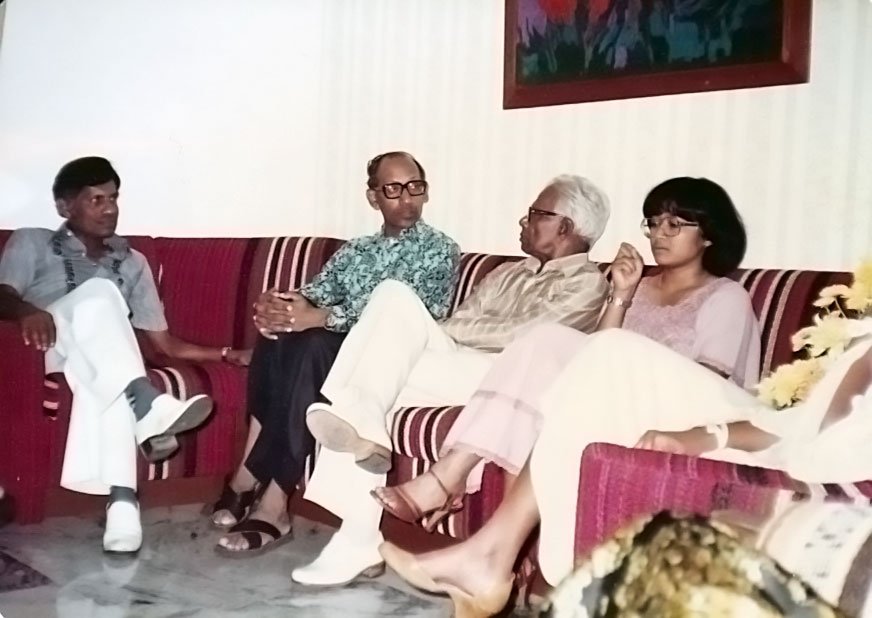
Pathmanathan, Dr Dilip Sen (Obstetrician & Gynaecologist, University Hostipal, Ambi, Nalini (granddaughter)
“This is how we look” September 1983
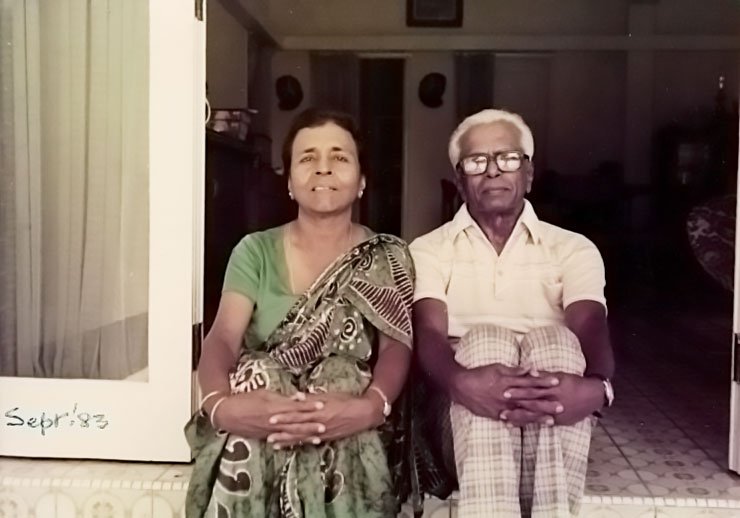
I get baptised into the Christian Church
In August 2001, aged 95, joined the Christian church. I commemorated my baptism with a lunch party at the Century Hotel. Our guests were Mr and Mrs Paul Abisheganaden, Mr.and Mrs N.Vaithinathan, Evelyn Norris, Mr.and Mrs Soh Chee Tiong, Mr.and Mrs. M K Sharma, Mr and Mrs R. Fernando, Benjamin and Veronica, Agatha and Esther. Maureen and Rose, Mary, Mr and Mrs Kee Ying Fatt, and Leela. Bill & Helen Lopez (regrets) I ruminate in my old age.
My philosophy and values.
I believe Vivekananda said that dedication to one’s work is also religion. I became dedicated to the teaching profession because I enjoyed teaching and watching the progress of my pupils – not because I wanted to earn promotions.
I have always held the values of justice and fair play close to my heart. I have stood up for justice even at the risk of getting into trouble with those who misunderstood me. However, I guess even my harshest critics appreciated my steadfast belief in justice and fair play. For example, I was not a devout temple worshiper who participated in all the rituals of religion. Probably I was criticised by many for failing to attend rites and ceremonies of temple worship. However, the temple committee appointed me as one of their Trustees, and held me in that position for 25 years. After that, I had to get myself released because I felt that I should give way to a younger person. I am most grateful to both my superiors in Education and my community for their appreciation, or tolerance of my ways.
Was the college education worthwhile?
I acquired the education at Raffles College at great personal sacrifice. Now, in my ninth decade of life, I sit and reflect – was it worth it? I respond with a resounding YES.
The college education provided me the foundation to:
- Enjoy teaching secondary school classes
- Train school hockey teams
- Supervise the publication of the school magazine
- Guide the school literary and debating society
- Found the school historical society
- Edit CHORUS (Journal of the Teachers Associations of Singapore and Malaya)
- Lead the Singapore Techers Association to appeal for revision of the teachers’ salary scheme
- Found the Graduate Teachers Association
- Appeal successfully to Governor Sir John Nicoll to implement the new salary scheme for teachers the included opportunity for teachers to be promoted to high level managerial posts (the scheme proposed by a Committee of the Legislative Council had been shelved by his predecessor)
- Become a lecturer at Raffles College, and later at the University (initially part time, and subsequently full time)
Successfully perform the functions of Deputy Secretary/Deputy Director of Education, Singapore
Rewards
In the early years of my work, the scope for promotions for Asian was very limited. Most of us hardly thought about it. Thoughts of promotion for Asian teachers began to surface only after World War II when there were few new expatriates joining the education service. After David Marshall set up the Malayanisation Commission in post-war Singapore, thoughts of promotion seem to occupy the minds of more and more teachers. My academic qualification was only a Raffles College Diploma in Arts. The Government had made the Honours Degree a prerequisite for teachers to get promotions. Therefore, I did not expect any advancement beyond being a classroom teacher.
I was disappointed to see some of my colleagues neglecting their students and their teaching responsibilities, and instead opted to further themselves by devoting their energies to studying for an Honours Degree in order to qualify for promotion. For me, promotion was never a major motivating factor.
I did not confine my dedication to mere classroom teaching. As you will see from the previous paragraph, I did my best to broaden the horizons of pupils in Raffles Institution. In addition, I contributed to bettering the education service in Singapore and the position of teachers. The fact that I did not have an Honours degree did not keep me down – my dedication also got me rewards that I had not expected. The Public Services Commission gave me promotions over several Honours graduates.
I was very happy that I become a teacher and remained one, always thinking of the best I could do for my pupils. I am grateful to Mr Nielson who had the foresight to discourage my attempt to leave the education service for better prospects in the civil service.
On looking back, I feel that my dedication to teaching served to propel me step-by-step as I rose to the second highest post as in the Singapore Education Service as Deputy-Secretary/Deputy-Director of Education. In later years, Raffles College and later the University employed me as a part-time tutor in preference to Honours Graduates. In addition, the Principal designate of the proposed Teachers’ Training College, Mr. Joseph, persuaded me to organise the College and be one of the first lecturers in English, in preference over Honours graduates.
I guess the authorities appreciated my dedication and this probably gained for me the degree of recognition that resulted that led to my promotions.
Differences in attitudes between the latter day expat officers and the early Asian officers
My personal experience was that the good expat officers, like McLeod did not take offence when I put forth opinions contrary to his. He merely countered them. Similarly, my experience with Mrs Symonds and Mr Clarke showed me the many expat administrators were not vindictive even towards persons who stood up with reason for their rights. In contrast, the early Asian administrators were offended and become repressive if a subordinate presented differing views. One Asian boss of mine took vindictive actions against not only me, but also my family after I retired, although one of my main reasons for taking early retirement was to avoid further clashes.
My inner conflicts
I suffered several conflicting and unwelcome experiences both while I was working and after retirement. These experiences set my heart and mind against each other and as a result, I fully believed I had only a few more years of life. I think this is the reason I never really planned for retirement nor had the urge to live a more “productive existence” after I retired.
However, in retrospect, I was not “unproductive”, as alleged by some people. Although I did not actively seek occupation, many demands came my way. Examples are my work at the University, Teachers’ Training College, in the adult classes, in Stamford School, serving as a Trustee of the Singapore Ceylon Tamils’ Association, as President of Ceylon Sports Club, and in various committees, and writing articles for magazines and editing/publishing the Seletar Golf Club magazine.
Furthermore, since I did not have fixed commitments, I was able provide substantive contribution to the upbringing of four of my grandchildren.
At 95, I thank God for guiding me into a healthy, long and gratifying life with a loving wife, healthy, happy and loving children, grand-children and great-grand-children. In spite of my academic qualification being only that of a Raffles College Diploma, not an Honours degree, luck in working under appreciative superiors earned me promotions right up to the post of Deputy Director/Deputy Secretary of Education. I was Acting Director /Permanent Secretary when I retired from the service in 1961.
I wish brother had lived longer to feel pleased that his generosity had made me a much better person than he had feared I would turn out to be. I pray to God to bless his soul.
EPILOGUE
Excerpts from the Speech by Dr. Chan Peng Mun
President of the Old Rafflesians Association (ORA) at Ambiavagar’s 90th birthday celebrations in October 1995.
Mr. Ambivagar is the epitome of a gentleman. We know the special meaning of this key word. According to the Oxford Dictionary ‘A man of honorable and kindly behavior; a man of good social standing.’
He always gave of his best. His teaching produced happy results. During his time in R.I, there was a saying “With Ambi you don’t mess around”. His devotion to duty was legendary. He was professional enough to set an example.
One of his students, Dr. Wong Yip Chong (now a senior consultant psychiatrist) said, ‘Every student had to write a weekly essay. Ambi marked and returned each essay in time to begin the next week’s essay. I estimate that Ambi worked an extra 20 hours a week to mark our essays! Such was his devotion to his charges’.
Mr. Satpal Khattar, Vice Chair of the Board of Governors of Raffles Institution recalls, “As students he made us proud of Raffles Institution. He had a warm heart and established excellent rapport with students.”
Dr.Tan Cheng Bok, Member of Parliament for Ayer Rajah, gave Peng Man permission to recall his experience:
‘My father passed away when I was still in school, and I had to terminate schooling to earn a living. Mr. Ambiavagar intervened and managed to get me a bursary although it was past the date for applications. I would not be what I am today without Mr Ambiavagar’s help.’
Chan Peng Man said,
“I did not have personal knowledge of Mr Ambi in school. My first dose of Ambi happened at an ORA function in the 1980s. The Guest of Honour and I were in conversation. He was expounding something at length. A white haired dignified man walked into the hall. Immediately, the Guest of Honour stopped his exposition, and without bothering to excuse himself from me, his host, he darted towards this man. All he wanted was to greet his dear old Ambi.
At subsequent ORA functions, I noted the demeanour of prominent old Rafflesians from various decades. Sattar and Tan Cheng Bok in their forties, Joethi and Tommy Koh in their fifties, and Wong Yip Chong and Sam Sinnadurai in their sixties, all behaved like school boys as they greeted their old school master with soft words spoken with proper enunciation, standing straight, and nodding their heads in agreement with whatever he talked about.
Ambi was a proud man. I noticed, he never approached a VIP expecting to be acknowledged. Instead, the Guest of Honour invariably went up to his table to greet him.”
